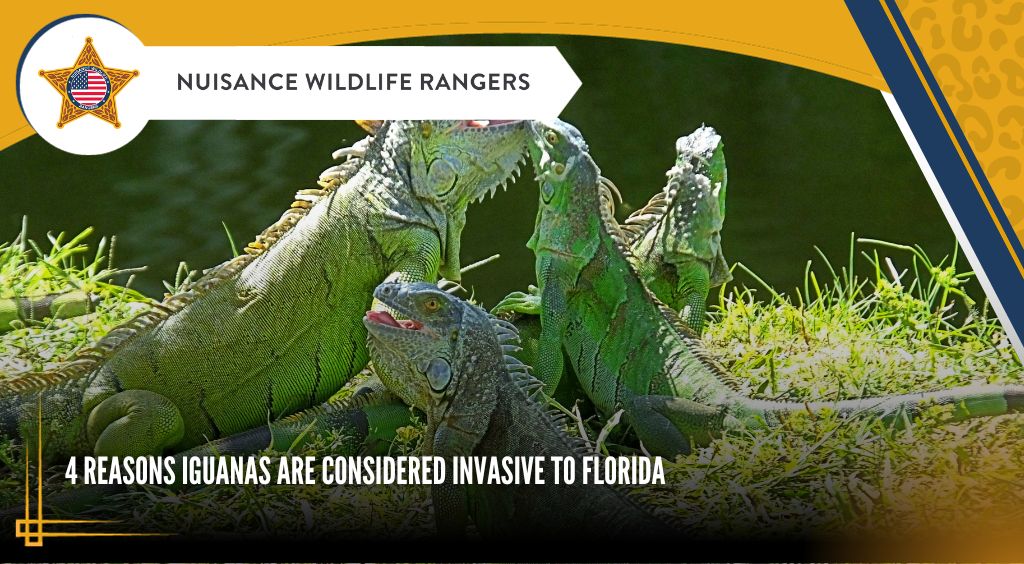
If you live in South Florida, chances are that you’ve seen a green iguana. It is important to note that green iguanas can be brown, black, or green, and have splashes of pink or red on their bodies. You might find them roaming around your yard, hiding in trees, or even crossing the road.
While iguanas are all over the southern area of Florida, this reptile is not native to the area. You will probably see more of them around riverbanks, beaches, and sandy locations, as they nest in these areas to mate during October and November. Since female iguanas can lay up to 76 eggs at a time, it is important to have some form of iguana control.
Iguanas are considered invasive in Florida because they can significantly damage structures, eat important plants and animals, and spread salmonella among animal and human populations.[1]
4 Reasons Green Iguanas are Considered Invasive in Florida
While green iguanas can be fun to look at, these animals are considered invasive in Florida. When an animal is invasive, this indicates that they negatively impact the environment around them in some manner, as they were not originally born into the local ecosystem.
Four reasons iguanas are considered invasive in Florida are:.
1. Their Diet Impacts the Local Environment
Green iguanas are originally from South America and began appearing in South Florida in the 1960s. These animals eat important plants throughout Florida’s ecosystem such as leaves, blossoms, and fruiting plants like hibiscus, jasmine, and fan palms.
Even though iguanas are considered herbivores, sometimes they eat other animals. Iguanas might eat tree snails, bird eggs, and even dead animals they find along their paths.
Because iguanas eat plants and animals that are important to the ecosystem around them, they are considered an invasive species.
2. They Can Damage Landscaping
Iguanas are attracted to lush landscaping because they are originally from parts of South America that look similar. If your yard has a lot of greenery, a garden, or trees, you might find iguanas around your property. This can be a problem as iguanas will damage your landscaping to eat and nest in your gardens.
3. They Destroy Structures
While iguanas might seem harmless, they can actually damage the structures around them. Iguanas burrow into the ground, so they can destroy seawalls, tear up sidewalks, permanently damage the foundations of your home, and even claw through your roof while climbing your home.
4. They Spread Salmonella
Lastly, if you have iguanas around your home, you have probably noticed their droppings. Not only is it unappealing to have iguana droppings on your walkways, but it can be dangerous to pets and small children. Sometimes, iguana droppings contain salmonella, which can cause you or your family members to get sick.
Ways to Keep Iguanas Away From Your Home
If you are worried about iguanas overrunning your property, there are a few things you can do to avoid them. The first thing you should do is avoid taking souvenirs from other places like fruits, plants, or vegetables, as these items can have non-native species like iguanas hiding inside of them.
Other ways to prevent iguanas from coming onto your property include:
- Changing the plants in your yard to a species that iguanas do not eat like milkweed, citrus, or oleander
- Clear fallen fruit from your yard
- Keep pet food inside
- Never leave food out on your back patios
- Secure your garbage cans properly
- Use tree wrap to prevent them from climbing your trees
- Keep your bushes and shrubs trimmed
- Filling holes to discourage burrowing
- Hanging wind chimes, as the noise can repel iguanas
- Spray iguanas with hoses or set up sprinklers to deter them
- Cover your swimming pool to prevent iguanas from defecating in them
If you currently have an iguana problem on your property, it’s important to handle removing them with care. Iguanas are protected by anti-cruelty laws, so you should avoid hurting them or endangering them in any manner. With that being said, it can be difficult to remove iguanas on your own without hurting them or contracting salmonella in the process.
You should always contact a professional wildlife removal company when you have an iguana infestation. Companies like Nuisance Wildlife Rangers can send an expert out to your home to assess the problem and remove the iguanas safely and ethically.
Ethical Iguana Removal With Nuisance Wildlife Rangers
If you or a loved one has iguanas in your home or on your property, it’s time to consider contacting a professional wildlife removal company. Iguanas are an invasive species and can be a considerable nuisance, damaging gardens and even entire structures. When you work with a wildlife removal company, you can rest assured that the iguanas will be removed and prevented from ever returning.
Nuisance Wildlife Rangers is one of the largest, privately owned companies, in Florida, which offers professional wildlife and animal removal. We have been in existence for the last 5 years and we provide exceptional wildlife removal services. We specialize in Iguana Removal, Iguana Trapping, and complete Iguana Control solutions.
To learn more about how we remove iguanas safely and ethically, contact Nuisance Wildlife Rangers today.
References:
- Cornell Chronicle: Salmonellosis and iguanas go hand-in-foot, Children, and elderly are most at risk from pet lizards’ bacterial infections, Retrieved November 2023 From https://news.cornell.edu/stories/1996/04/salmonellosis-and-iguanas-go-hand-foot
